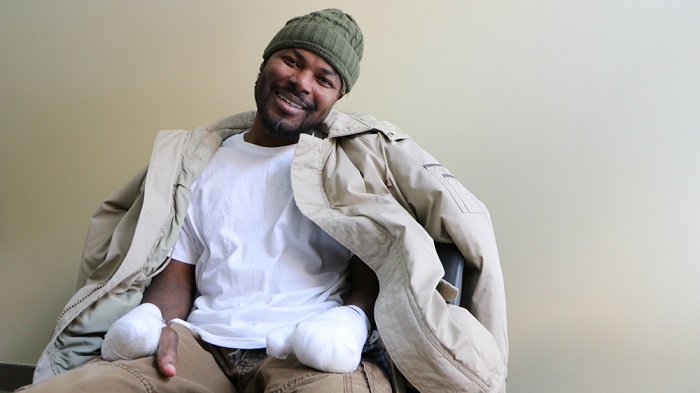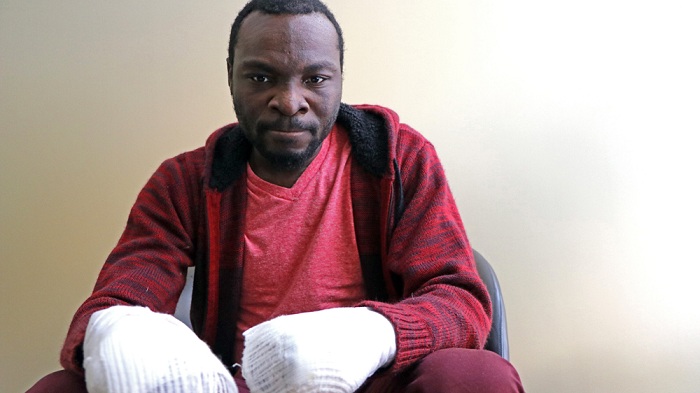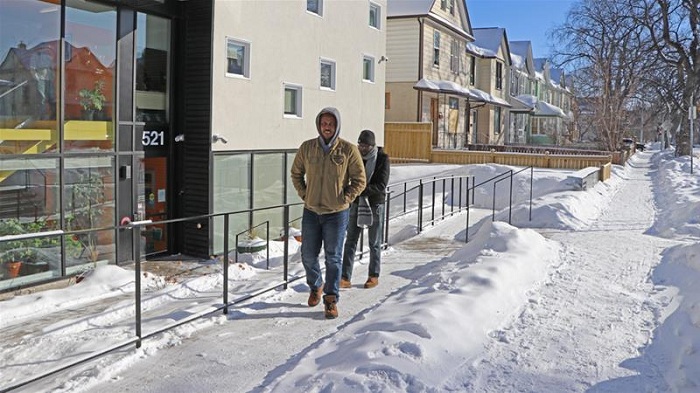Then, out of the darkness, a highway appeared. They had arrived in Canada. One of them pulled out their mobile phone to call 911.
"Wow, it was very, very cold," Ahmed, 36, recalled. "You could not walk about the ice. It was too much. Sometimes, it reached our knees. We didn`t feel sometimes our hands, sometimes our feet."
Hours earlier, Ahmed, Mualim, and three other African men paid a man $500 to drive them from Minneapolis, Minnesota to North Dakota, just three miles south of the Canadian border. They were underdressed for the winter temperatures, wearing only light gloves and spring jackets.
"Sometimes, you cannot walk because the snow is very big - sometimes above your knees," Mualim, 28, explained.
Since arriving in Canada on February 3, Ahmed and Mualim have both filed asylum claims.
In recent months, hundreds of refugees have trickled across the US border into the western prairie province of Manitoba, which lies above North Dakota and Montana. Normally, only 40 to 60 cross each year.
The Manitoba Interfaith Immigration Council (MIIC), a non-profit organisation in Winnipeg that provides food, shelter, paralegal services and helps refugees file their asylum claims, has seen an unprecedented spike in refugees seeking their help.
"There were 21 people who crossed the border since [last] weekend," said Rita Chahal, the executive director of MIIC. "In January alone, we had 40 [refugees] and since October to [the] end of January, we had 118 [refugees]. Those are huge numbers because in an average year we would normally see generally between 50 and 60."
In her five years at MIIC, Chahal has never seen anything like the current spike and she said that several refugees filing asylum claims expressed that US President Donald Trump is the reason they`ve made the jump to Canada.
Mualim and Ahmed say they were spooked by Trump and his immigration ban, which prohibited the entry of nationals from seven Muslim-majority countries - among them Somalia - for 90 days. Their decision to flee the United States was largely influenced by the president.
"Why I have to flee, is because of Donald Trump," Ahmed said.
"It`s not safe, so I run. When new president came in, everything changed. The hate speech. The people who have the documents, the status, and everything, they cannot come in."
Upwards of 90 Somalis, many of whom have had their refugee cases denied, have already reportedly been deported since Trump`s immigration ban, which has been temporarily blocked by a federal judge.
"It was very hard but we didn`t have a choice," said Mualim. "I couldn`t stay and feel safe any more in the United States. You have no choice or they will deport you back. You have only one choice: to cross the border."
`If I go back, I will be killed`
Ahmed and Mualim had both applied for asylum in the US but were denied. They said they had valid work permits and were both working as truck drivers before coming to Canada.
"If I go back to Somalia, I will be killed - 100 percent sure," said Ahmed, whose father, a community leader, was murdered by gunmen from a rival clan near the Kenyan border in Somalia.
Ahmed fears his father`s killers will come for him next, if he returns.
Mualim, too, was running from violence. Al-Shabab murdered his brother, who they suspected of being a spy.
"As soon as they killed my brother, there was no option but to leave the country," Mualim said.
MIIC is helping Mualim and Ahmed adjust to life in Canada, as well as overseeing their refugee claims. Chahal, the executive director, said her organisation typically has a 60 percent acceptance rate for their clients.
"There are human lives that are at stake," she explained. "The people who are crossing and making these very horrendous journeys and taking risks, they`re not thrill-seekers. They`re people who are running for their lives for different reasons."
Harvard Law school released a statement last week that reinforced that the US is no longer a haven for refugees, stating that, "The substance of President Trump`s recent executive orders highlights this administration`s hostility toward refugees and asylum seekers."
In 2015, 4,316 people made refugee claims, according to Canadian Border Services Agency. That number nearly doubled to 7,022 in 2016, the organisation informed Al Jazeera. The majority of these refugees were from Syria, Iraq, Afghanistan, Pakistan, Colombia, Eritrea, and Burundi. But those thousands account only for refugee claims made directly at border crossings across Canada and do not factor in illegal entries.
Stories like those of Mualim and Ahmed, who illegally crossed into Canada, are becoming more commonplace. The Royal Canadian Mounted Police (RCMP) told Al Jazeera that they arrested 249 refugees who entered illegally from the US in 2015. That number shot up to 444 in 2016, and, so far this year, they`ve seen 41 illegal entries.
"We have people and technology to protect that border, but people do enter illegally," said Tara Seel, a media spokesperson for the RCMP.
The border between Canada and the US is the longest undefended border in the world. It stretches more than 500 kilometres across Manitoba alone.
Howard Friesen, a southern Manitoba soybean farmer was sipping his coffee on a spring morning in 2015, when he saw a Somali refugee caked in mud walking across a field outside his house.
"I thought it was a deer, or some kind of wildlife, originally when I first saw the movement," Friesen, who lives just miles from the Emerson border crossing, recalled.
"He was all covered in mud. One of the first things he asked me [was], `Am I in Canada?` I could tell the guy was cold and all full of mud, so I took him home and cleaned him up."
The Somali man devoured six eggs, ate nearly as many pieces of toast, drank coffee and took a shower in Friesen`s house.
"He was quite hungry," Friesen added. "I guess he had been walking. In his backpack, basically, all he had was a clean set of clothes. He had a toothbrush, deodorant, a cell phone, he had some American cash and that was all."
Friesen said his neighbours have also increasingly seen refugees roaming their fields in recent years.

Razak Iyal, a 35-year-old Ghanaian, lost nearly all the fingers on both his hands to frostbite crossing into Canada [Geraldine Malone/Al Jazeera]
Losing fingers to the cold
Among those refugees entering illegally, especially those who make the trek in the dead of winter, some are not quite as lucky as Ahmed and Mualim.
Razak Iyal, a 35-year-old Ghanaian, lost nearly all the fingers on both his hands to frostbite crossing into Canada on Christmas Eve. Doctors amputated all of his fingers, except his thumbs. His bandaged hands are a daily reminder of that horrific passage.
"That was a terrible night. I`ll never forget about this night in my life," said Iyal. "After like two weeks, the doctors told me that you`ll lose your fingers. From that day, when they told me that, I cried from the morning that they told me until 7pm."
Slipping on a t-shirt or running shampoo through his hair are now agonising tasks.
"It`s very difficult for me now," said Iyal. "I cannot take a shower by myself. Sometimes, I cannot wear my pants by myself. But I`m trying."
Iyal owned an electronics and appliance store in Ghana before fleeing his home country, where he believed his life was in danger, in 2012. He landed in South America and slowly made his way up to Mexico, from where he entered the US.
When he came to the US, he was detained for about two years, before being released under the condition that he report to an immigration office every three months. His claims for asylum were denied.
Two months ago, Iyal was living with his uncle in the Bronx. He caught a bus to Minneapolis after he learned that immigration officials were looking for him with the intention of deporting him.
Upon arriving at the Minneapolis bus station, he met another young Ghanaian, a 24-year-old named Seidu Mohammad. The two quickly became friends and formulated a plan to cross into Canada, unaware that a near-death experience awaited them.
After hitching a ride from Minneapolis to near a border crossing in North Dakota, the pair stumbled through snow-blanketed fields until they were in Canada. They, as well, were ill-prepared for the elements. Iyal said vicious gusts of wind ripped off their gloves and blew them away, exposing their hands. Their fingers soon became stiff, so numb and frozen that they could not even dial for help on a mobile phone.
When Iyal and Mohammad arrived in Canada, they stood on the side of the highway trying to flag down cars for four or five hours. A ruthless blizzard would soon shut down highways in the province and ground flights out of Winnipeg. A truck driver eventually stopped to pick them up. Iyal`s friend collapsed in the driver`s cab soon after.
"His hands was frozen, like when you put chicken in the freezer - that`s how frozen Seidu [Mohammad`s] hands [were]," said Iyal. "I feel for Seidu on that day. He was crying and could not do anything. Seidu was unconscious - he cannot say anything. He`s just breathing. I`m saying, `Don`t die, please Seidu, don`t die.`"
Mohammad lost all his fingers, too.

Seidu Mohammad also lost his fingers to frostbite during the crossing to Canada [Geraldine Malone/Al Jazeera]
The Canadian dream
"My clients` lives are in danger in Ghana," said Bashir Khan, Iyal and Mohammad`s immigration lawyer in Winnipeg. "That`s what brought them on such a fantastic trek leaving Africa behind, risking their lives with literally the shirts on their back."
Iyal, is in high spirits, despite the perils he has endured. He is recovering in an assisted care facility and spends his days watching football and the news in his room. Other days, fellow patients help him play dominoes and chess in the common area. He`s eager to get a winter jacket and often wonders when the snow in Winnipeg will melt.
Iyal and Mohammad`s tale of survival has resonated in Winnipeg, especially with the city`s Ghanian community. They have received visits from strangers, who have dropped off home cooked meals, clothes, and money.
"Canada is the best country in the world, in terms of receiving immigrants and refugees, because I see the way the United States treats people and treats me," Iyal said. "Canada is the best. They receive us like we are part of them, like this is our home. I`m part of them now."
Iyal`s case for Canadian asylum will be heard in immigration court on March 27. He hopes that one day his wife, still in Ghana, can join him in Canada. He also dreams of one day enrolling in business classes at a Canadian university.
"I have a message for every refugee in the world: I know it`s not easy to run from your country," Iyal said.
"You leave your home. You leave your family. You leave everything behind. Never give up. Fight for your right, everywhere you go. Don`t give up. As a refugee, you have the right to seek refuge everywhere in the world. That`s the message I have for everybody, those in the United States and those around the world."
Dorian Geiger is a Canadian journalist and an award-winning filmmaker. He`s a social video producer and a freelance features writer at Al Jazeera English.
More about:
















































